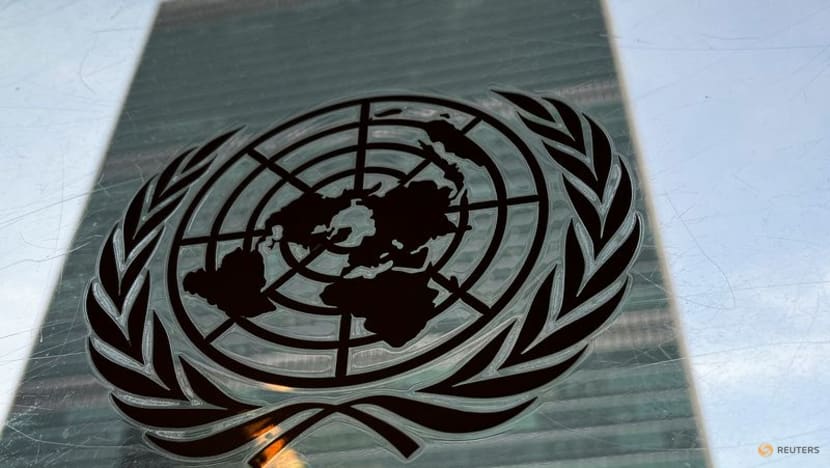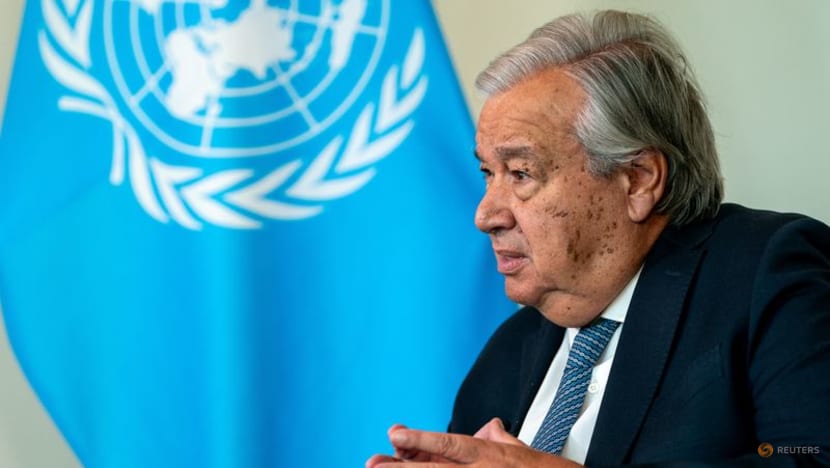Advertisement
Critics have said the international body is failing in its central mission of maintaining peace, as bloodshed intensifies in conflicts across the world.

The United Nations headquarters building is pictured with a UN logo in the Manhattan borough of New York City, New York, U.S., March 1, 2022. (File Photo: REUTERS/Carlo Allegri)
New: You can now listen to articles.

This audio is generated by an AI tool.
World leaders are convening in New York for the 79th United Nations General Assembly (UNGA), amid repeat calls for multilateralism and against a backdrop of ongoing wars and trade tensions.
Known as the “high-level week” or “leaders’ week”, all 193 member states will be given a chance to speak at the annual forum set to open on Tuesday (Sep 24).
The UN itself is facing an existential crisis as its relevance is increasingly questioned.
Critics have said the international body is failing in its central mission of maintaining peace, as bloodshed intensifies in conflicts across the world.
While Ukraine and Gaza are expected to dominate the agenda in New York, observers were pessimistic on any meaningful progress stemming from the discussions.
Dr Andrew Latham, a senior fellow at foreign policy think tank Institute for Peace and Diplomacy, said he expects the usual “posturing and virtue signalling” from member countries on the Israel-Hamas war that will leave no impact on the ground.
“The Israelis feel they’re in an existential struggle. Hezbollah … and Hamas (also) feel they’re in an existential struggle,” he told CNA938’s Asia First.
“Nothing that’s going to come out of New York is going to make the tiniest bit of difference.”
The almost year-long conflict in Gaza is on the verge of spilling over to Lebanon with the involvement of Hezbollah, bringing the Middle East ever closer to an all-out war.
Observers added that attention and aid need to also be given to other less prominent but similarly pressing conflict zones including Sudan and Myanmar.
Simon Adams, CEO of non-profit organisation Center for Victims of Torture, said: “The fact that the Security Council is unable to have any meaningful role in resolving (these) conflicts … casts a dark shadow over the entire UN and causes people to lose faith in its future.”
CALLS FOR REFORMS TO UNSC
UN Secretary-General Antonio Guterres has defended the institution’s legitimacy, but has repeatedly called for reforms to the “outdated”, “unfair” and “ineffective” Security Council.
The council is charged with securing and enforcing peace, but veto power wielded by its permanent members – Britain, China, France, Russia and the United States – has consistently paralysed such efforts.
“The Security Council can’t get anything done because of the vetoes that the five members have,” said Latham, adding there needs to be fairer representation to reflect the balance of power.

World leaders have backed calls for reforms and are likely to discuss the prospect of adding new countries to the permanent seats and a rotating seat for small island developing states.
Finland is also proposing the removal of veto powers from all Security Council members.
“It is difficult when some countries have a lot more power than others… and powerful members are able to keep crucial challenges off the agenda,” said international relations professor Bec Strating from La Trobe University.
“Expanding the council is an important step to make sure there are more diverse voices at the table.”
However, there is scepticism that there will be any significant change.
Latham said countries with the power to veto – namely the five – are expected to oppose such reforms as the move will diminish their leverage and power.
IS THE UN STILL RELEVANT?
Still, the UN is an important international institution that is inclusive and broadly representative, and states must commit to multilateralism to combat global threats, said analysts.
“What’s the alternative?” asked Latham. “On a global level, all we really have is the UN… which expresses the shared sentiment of the vast majority of the world.”
Strating added: “The UN’s ability to be a space to represent states, whether they are big or small, is incredibly important. Part of the challenge for the UN is reviving its credibility.
“The UN is supposed to be the key institution that promotes peace and stability in the world. If it’s unable to do that… if global multilateralism is failing… then other institutions emerge, and they are not as representative or inclusive as the UN.”

She pointed to a growing number of regional strategic “mini-laterals” including the Quad – a security dialogue between Australia, India, Japan, and the US; and AUKUS – a trilateral security partnership between Australia, Britain, and the US; as examples of the world becoming more fragmented.
“The world is splitting into blocs, and that is not what we want to see. This is why we should be supporting the renewal of UN multilateralism,” she said.
“There really needs to be much greater political will from global leaders to… promote a harmonious and peaceful world.
“(But) we need to realistic keep our expectations about how much change can come from this one week alone (at the assembly).”
Other topics expected to be discussed at the UNGA, which will run through to next Monday, include the threat of rising sea levels, antimicrobial resistance, and global nuclear disarmament.
































